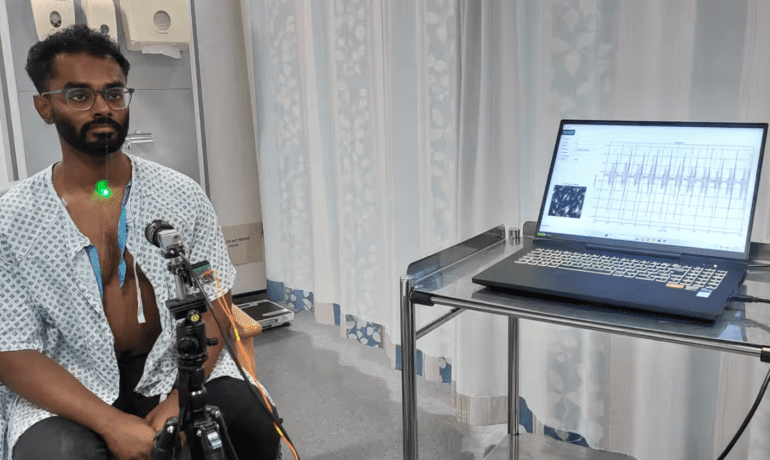TL;DR:
- Glasgow University unveils AI-driven laser heart monitor technology.
- The system remotely reads heartbeats, aiding in the early detection of cardiovascular issues.
- Offers convenience with potential use in shopping malls and home health monitoring.
- Overcomes limitations of traditional stethoscopes.
- High-speed cameras and laser technology combined with AI filter out extraneous signals.
- Enables personalized monitoring based on individual cardiac patterns.
- Startup company LightHearted AI seeks venture capital for further development.
- Potential applications in biometric identification.
- It is expected to be ready for widespread use in the near future.
Main AI News:
Researchers at Glasgow University have unveiled a groundbreaking technology that could redefine the way we monitor our health. This innovative system harnesses the power of AI and quantum technologies to read an individual’s heartbeat remotely, offering early detection of potential cardiovascular issues. In a world where healthcare accessibility and efficiency are paramount, this development holds tremendous promise.
Professor Daniele Faccio, leading the project at the university’s Advanced Research Centre, envisions a future where this technology can be readily available to the masses. “Imagine having booths in shopping malls where people can conveniently get a quick and accurate heartbeat reading, seamlessly integrated into their online medical records,” he suggests. Alternatively, laser heart monitors could become an integral part of household health monitoring systems. These systems would include devices for tracking blood pressure anomalies and subtle changes in gait, which can be early indicators of conditions like Alzheimer’s disease.
The significance of remote heartbeat monitoring lies in its ability to detect irregularities, such as murmurs or abnormal heart rates, which can serve as early warning signs for strokes or cardiac arrests. Unlike traditional stethoscopes, which have been in use for over a century, this new technology requires no physical contact with the patient. It eliminates the need for specialized training and the potential for human error, making it a game-changer in healthcare.
Traditional stethoscopes, invented in the 19th century by French surgeon René Laënnec, rely on a disk-shaped resonator to pick up internal body noises. However, they have limitations. “Properly using a stethoscope demands skill,” explains Faccio. “Too much pressure on a patient’s chest can obscure heartbeat signals, and it can be challenging to discern subtle background murmurs that provide critical diagnostic information.”
The cutting-edge system developed by Faccio and his team combines high-speed cameras capable of recording at an astonishing 2,000 frames per second with laser technology. By shining a laser beam on a person’s throat, the system measures minute fluctuations in the skin’s movement caused by the expansion and contraction of the main artery as blood flows through it. These minuscule movements, on the order of billionths of a meter, are then analyzed with the assistance of AI algorithms.
The AI plays a pivotal role in filtering out extraneous signals, isolating the vibrations generated by the heartbeat, even amid the presence of larger chest movements, such as breathing. Faccio elaborates, “We use advanced computing systems to filter out everything except the vibrations caused by a person’s heartbeat – even though it is a much weaker signal than the other noises emanating from their chest. We know the frequency range of the human heartbeat, and the AI focuses on that.”
The resulting data enables healthcare professionals to detect changes in heart rate, not in comparison to a statistical average but against an individual’s unique cardiac patterns. This personalized approach to monitoring promises to pinpoint specific defects and abnormalities early on.
With these remarkable capabilities, Faccio’s team has founded LightHearted AI, a startup seeking venture capital to further develop their devices. The potential applications extend beyond healthcare, as this technology also holds promise for biometric identification.
While biometric applications are compelling, the primary focus remains on enabling convenient and rapid heartbeat measurements outside traditional medical settings. Faccio optimistically asserts, “We hope to have this technology ready for widespread use next year, and the benefits it could bring are substantial.” In a world where health is paramount, this AI-powered laser heart monitor could revolutionize the way we care for ourselves and others.
Conclusion:
The introduction of AI-powered laser heart monitors represents a significant leap forward in healthcare technology. With the potential for convenient, non-invasive monitoring in various settings, this innovation has the power to revolutionize healthcare and holds promising opportunities for market growth, especially in the field of personalized health monitoring and biometric identification.

